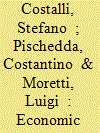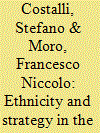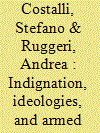|
|
|
Sort Order |
|
|
|
Items / Page
|
|
|
|
|
|
|
| Srl | Item |
| 1 |
ID:
178935


|
|
|
|
|
| Summary/Abstract |
Fringe terrorism is common during nonviolent campaigns. We examine how this can modify the strategic environment between dissident groups and the state in ways that present both challenges and opportunities to moderate factions. Terrorism is intended to promote violent escalation in a conflict, but we argue that fringe terrorist activities in a nonviolent campaign under certain conditions can induce an advantage for well-organized moderate factions. The risk of escalation following terrorism can give the government more incentives to offer concessions to moderate campaign leaders if the movement can credibly prevent armed escalation. The ability to control and prevent violence is more likely when nonviolent movements have a hierarchical structure and a centralized leadership, as such campaigns are better able to prevent shifts by supporters towards violent fringes. Using new data on terrorist attacks by factions sharing the same overall objectives as ongoing nonviolent campaigns, we show that nonviolent campaigns are more likely to see substantial gains in spite of fringe terrorist activities when a movement has a hierarchical structure and a centralized leadership.
|
|
|
|
|
|
|
|
|
|
|
|
|
|
|
|
| 2 |
ID:
151117


|
|
|
|
|
| Summary/Abstract |
There is a consensus that civil wars entail enormous economic costs, but there is little systematic analysis of the determinants of their heterogeneous destructiveness. Moreover, reliably estimating these costs has proven challenging, due to the complexity of the relationship between violence and socio-economic conditions. In this article, we study the effect of ethnic fractionalization of war-torn countries on the economic consequences of civil war. Building on an emerging literature on the relationships between ethnicity, trust, economic outcomes, and conflict processes, we argue that civil wars erode interethnic trust and highly fractionalized societies pay an especially high price, as they rely heavily on interethnic business relations. We use the synthetic control method to construct appropriate counterfactuals and measure the economic impact of civil war. Our focus is on the years of armed conflict in a sample of 20 countries for which we observe an average annual loss of local GDP per capita of 17.5%, though with remarkable variation across cases. The empirical analysis provides supporting evidence in the form of a robust positive association between ethnic fractionalization and our measures of war-induced economic costs.
|
|
|
|
|
|
|
|
|
|
|
|
|
|
|
|
| 3 |
ID:
117631


|
|
|
|
|
| Publication |
2012.
|
| Summary/Abstract |
The impact of ethnicity for the onset of conflicts has often been dismissed in the cross-country empirical literature on civil wars. Recently, however, several studies using disaggregated data have reached different conclusions and highlight the importance of the configuration of ethno-national groups. This article follows the latter approach and investigates a different phenomenon: the impact of ethnic heterogeneity on the severity of violence. Using disaggregated data at municipality level in Bosnia and Herzegovina, we perform a quantitative analysis to assess the impact of various indices of heterogeneity on the number of casualties that occurred in the 1992-95 war in the 109 municipalities composing the country. We argue that in a context where ethnicity plays a key role in shaping rivalry among groups, ethnic polarization, in particular, creates strategic incentives for severe violence as armed groups try to create ethnically homogenous territories in the first phase of the war. By also including the temporal dimension in the analysis, we show that ethnic polarization loses its impact as the war evolves over time; therefore, the geographic location of the municipalities becomes the best predictor of severe clashes because as the war goes on, ethnic groups shift their objective from creating internally homogenous municipalities to consolidating wider areas. As such, municipalities located on politically and militarily relevant frontlines experience the highest levels of violence.
|
|
|
|
|
|
|
|
|
|
|
|
|
|
|
|
| 4 |
ID:
142114


|
|
|
|
|
| Summary/Abstract |
Ideas shape human behavior in many circumstances, including those involving political violence. Yet they have usually been underplayed in studies of the causes of armed mobilization. Likewise, emotions have been overlooked in most analyses of intrastate conflict. A mixed-methods analysis of Italian resistance during the Fascist regime and the Nazi occupation (1943–45) provides the opportunity to theorize and analyze empirical evidence on the role of indignation and radical ideologies in the process of armed mobilization. These nonmaterial factors play a crucial role in the chain that leads to armed collective action. Indignation is a push factor that moves individuals away from accepting the status quo. Radical ideologies act as pull factors that provide a new set of strategies against the incumbent. More specifically, detachment caused by an emotional event disconnects the individual from acceptance of the current state of social relations, and individuals move away from the status quo. Ideologies communicated by political entrepreneurs help to rationalize the emotional shift and elaborate alternative worldviews (disenchantment), as well as possibilities for action. Finally, a radical ideological framework emphasizes normative values and the conduct of action through the “anchoring” mechanism, which can be understood as a pull factor attracting individuals to a new status.
|
|
|
|
|
|
|
|
|
|
|
|
|
|
|
|
| 5 |
ID:
174769


|
|
|
|
|
| Summary/Abstract |
What causes civilian victimization in conventional civil wars and in conventional wars that experience insurgencies? The authors argue that a key driver of civilian victimization is the vulnerability of the incumbent forces, specifically when the conflict’s front line is shifting. Vulnerability is a function of informational and logistical challenges: when the front line is moving, incumbents face increased informational uncertainty and unstable supply chains that augment their vulnerability. Thus, incumbents will increase the use of civilian victimization in response to a scarcity of high-quality information on the location and identity of insurgents, to limit possible information leaks, and to contain supply disruption and logistics support to adversaries. The authors support their argument using matched difference-in-differences analyses of original subnational data on Nazi-Fascist violence in World War II Italy (1943–1945) and qualitative evidence.
|
|
|
|
|
|
|
|
|
|
|
|
|
|
|
|
|
|
|
|
|